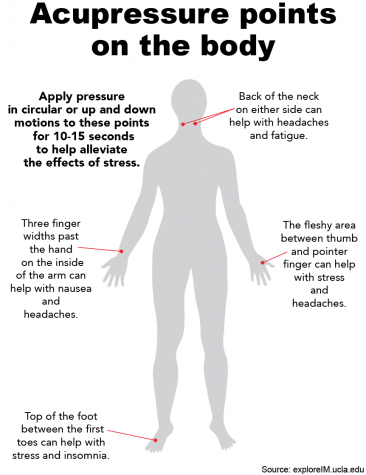Coping mechanisms relieve stress
April 23, 2020

WEB EXCLUSIVE Amidst the shelter in place order which instructs people to socially distance themselves, a new online learning system, and other life changes due to the COVID-19 pandemic, students may find themselves more stressed than usual which can have significant effects on the body.
“Everyone has their own experiences with stress, and everyone handles stress differently,” family therapist Rachel Greenberg said, “there’s no doubt that our bodies reflect what we are going through emotionally.”
Stress can have a huge impact on the body, both mentally and physically. Being unable to sleep, a common effect of stress, can be detrimental to the body and can generate appetite issues, loss of patience, and trouble focusing, according to Academic Support Coordinator Jen Kramer.
“The most common effects of stress on the body are on your thought process and getting stuck in those loops where you can’t get off a certain problem that’s sticking in your mind,” Kramer said. “There are many things that you can do to reduce stress, first is to really find your circle of support and someone to talk to.”
Implementing coping mechanisms such as acupressure points, areas on the body that can stimulate the nervous system to reset itself once pressure is applied, to help handle stress.
“There’s a little spot in the fleshy point of your hand — between thumb and pointer finger — and if you squeeze it, your stomach will start to unknot and you will take this little tiny breath,” Kramer said. “Subconsciously you’re setting things into motion.”
Having someone trace up and down the back with their fingers will help put the body’s parasympathetic and sympathetic nervous system into alignment which will help to ground and calm.
“When you’re so stressed out that you can’t feel your toes, that’s the time when you want to have a friend or family member step in and help you out physically,” Kramer said. “You’ll start to feel more grounded.”
Ways to combat stress include mindfulness and trying to focus on the things which are going well. Focusing on what went well — even just okay — instead of what went poorly can be extremely beneficial, according to Greenberg.
“Things that are negative tend to draw our attention and stick in a heightened way because that’s survival,” Greenberg said, “but changing the way that your brain pays attention to everyday things can change your body and your mood.”
Many individuals are feeling increased anxiety surrounding the COVID-19 pandemic as they are not allowed to go about life as they normally would, so going outside and being active is an effective way to combat this stress.
“I have found that being home all day has made me less productive because there are so many distractions,” sophomore Mads Richardson said. “Working out and being outside has really helped get me to focus on my school work better.”
It can also be beneficial to keep in touch with classmates and friends to get through this difficult time.
“The state of the world and the coronavirus — there are so many reasons to be stressed so there is a huge need to keep talking together,” Kramer said, “If people are not available, write down or draw a picture of what’s on your mind.”









